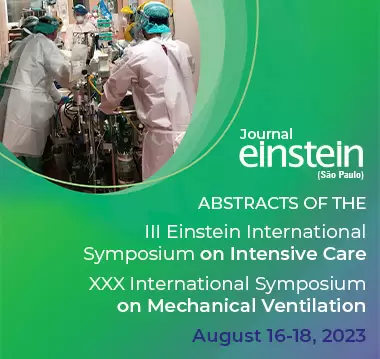einstein (São Paulo). 14/Aug/2023;21(Suppl 1):EISIC_MV0007.
Risk stratification for prolonged mechanical ventilation after cardiac surgery
DOI: 10.31744/einstein_journal/2023ABS_EISIC_MV0007
III Einstein International Symposium on Intensive Care and the XXX International Symposium on Mechanical Ventilation. Aug 16-18, 2023.
Category: Cardiology
Introduction:
After Cardiac Surgery (CS) patients require mechanical ventilation (MV) due to intraoperative and postoperative factors.() These factors may contribute to a prolonged period of MV, which may be associated with worse outcomes.(,) These factors are already known in other patient profiles, but this gap still exists when dealing with CS.
Objective:
To stratify the risk factors for mechanical ventilation in patients undergoing cardiac surgery.
Methods:
This is a prospective cohort conducted with patients undergoing CS. After surgery, the patient was admitted to the Intensive Care Unit (ICU), connected to MV and the whole process of ventilatory adjustment and weaning was conducted according to the unit routine. They were divided into two groups, the group that remained for more than 28 days on MV and the group with less than 28 hours. We compared the intra- and postoperative variables of the groups to identify which factors were associated with prolonged MV.
Results:
We evaluated 122 patients, and 33 remained on prolonged MV. In the comparison between groups, we verified that the time of surgery longer than 4 hours, cardiopulmonary bypass time (8912 versus 1059, p<0.001), presence of bleeding (10% versus 45%, p<0.001) and dependence on inotropics (27% versus 64%, p<0.001) were the main factors associated to prolonged MV.
Conclusion:
We concluded that factors such as length of surgery, cardiopulmonary bypass, presence of bleeding and use of inotropic agents favored prolonged mechanical ventilation.
97


